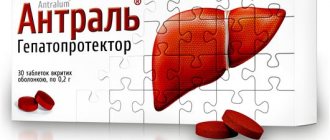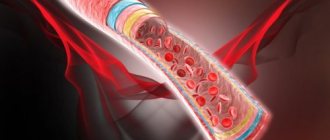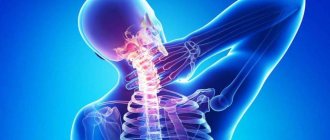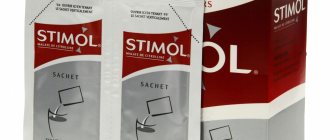Release form
Glutargin is presented on the pharmacological market in four release forms. These include:
- powder for the preparation of a solution intended for oral use – 1 g of active ingredient;
- injection ampoules – 40 mg of glutamate per 1 ml of medication;
- concentrate for the preparation of infusion solution – 400 mg per 1 ml;
- tablets for internal use - concentration 250 mg and 750 mg.
The pharmacological agent is packaged in glass ampoules, blister packs and cardboard boxes. The box contains 1 or 2 cell packaging.
Glutargin instructions and frequently asked questions
Stock
dyucha speech:
1 tablet containing arginine glutamate 250 mg (0.25 g) or 750 mg (0.75 g);
additional speeches:
dosage 250 mg – microcrystalline cellulose, crospovidone, croscarmellose sodium, calcium stearate; dosage 750 mg – microcrystalline cellulose, crospovidone, calcium stearate.
Medicine form Tablets.
Main physical and chemical authorities:
dosage 250 mg – white-colored tablets, with a flat surface, with a score and a bevel; dosage 750 mg – tablets of white color, subdued shape with a biconvex surface, with a score.
Pharmacotherapeutic group Drugs that are used to treat diseases of the liver and lipotropic speech. Hepatotropic drugs. Arginine glutamate. ATX code A05B A01.
Pharmacological authorities
Pharmacodynamics.
Glutargin is a combination of arginine and glutamic acid, which play an important role in the ongoing biochemical processes of neutralization and elimination from the body of highly toxic metabolites in the metabolism of nitrogenous substances - amiaku. Hypoamonic effects of the drug are realized by activating the excretion of ammonia in the ornithine cycle, the synthesis of ammonia, binding ammonia to non-toxic glutamine, as well as enhancing the excretion of ammonia from the central the nervous system and its excretion from the body. The effects of glutargin are reduced due to toxicity, including neurotoxic effects of ammonia.
Glutargin also has a hepatoprotective effect, due to its antioxidant, antihypoxic and membrane-stabilizing properties, and has a positive effect on the processes of energy supply in hepatocytes.
In case of alcohol intoxication, Glutargin stimulates the utilization of alcohol in the monooxygenase system of the liver, preventing the suppression of the key enzyme for the utilization of ethanol - alcohol dehydrogenase; accelerates the inactivation and elimination of toxic products of ethanol metabolism as a result of increased formation and oxidation of burshtinic acid; reduces the depressant effect of alcohol on the central nervous system due to the reduction of the neurotransmitter effects of glutamic acid. In spite of the authorities, Glutargin exhibits antitoxic and antiviral effects.
In case of pathology of endothelial vasculitis, the protective action of Glutargin changes the impaired penetration and thromboresistance of blood vessels, precedes hypercoagulation, reduces the sensitivity of blood vessels to vascular-sounding agents (endothelin, angiotensin, thromboxane), which cause generalized vasospasm. Arginine, after its advanced biotransformation into nitric oxide, performs a vasodilatory action, positively infuses the bloodstream with the functional power of circulating blood elements. As a result of the vasodilatory and antihypoxic effects of Glutargin, maternal-fetal hemodynamics improve, and intrauterine fetal hypoxia decreases. In case of pathology of vaginosis, the drug also exhibits antitoxic and hepatotic activity, acting as a non-specific metabolic regulator of metabolic processes. As a result, during pregnancy, Glutargin reduces the level of immune complexes that circulate in the blood, and the incidence of “metabolic” intoxication syndrome and immunotoxicosis associated with pensatory-persistent reactions to the body.
Glutargin does not exhibit embryotoxic, gonadotoxic, mutagenic or teratogenic effects, does not cause allergic or immunotoxic reactions.
Pharmacokinetics.
Didn't follow up.
Clinical characteristics
Indications for complex therapy of acute and chronic hepatitis of various etiologies, including severe hepatotropic weeds (toadstool, chemical and medicinal drugs), liver cirrhosis, leptospirosis i.
Hepatic encephalopathy, which is accompanied by hypermonia.
Acute alcohol withdrawal symptoms of mild to moderate severity, hangover syndrome, post-intoxication disorders caused by alcohol consumption.
Complications in the third trimester of vaginosis: late gestosis, including severe forms - preeclampsia and eclampsia, fetoplacental insufficiency, chronic pathologies of the hepatobiliary system in vaginates.
Contraindications: Sensitivity to the components of the drug. Loss of sleep, increased restlessness, severe impairment of the filtration (nitrogen) function of the blood.
Interactions with other drugs and other types of interactions The effect of glutargin on insulin secretion increases with one-hour stagnation of aminophylline. Glutargin may enhance the effect of antiaggregation agents (dipyridamole). Prevents and weakens neurotoxic effects that may occur when isoniazid is infused. Reduces the effect of vinoblastin.
Particularities of treatment: In patients with impaired functions of the endocrine glands, the drug stimulates the secretion of insulin and growth hormone. The drug activates ammonia binding in the blood, which can naturally be accompanied by short-term changes in blood levels.
The clinical administration of the drug during the first and second trimesters of gestation and during breastfeeding has not been observed. If necessary, apply the drug to the chest.
The importance of influencing the fluidity of the reaction during treatment with vehicles or other mechanisms.
Doesn't flow in.
Method of administration and dosage The drug is administered internally to adults.
Hepatitis, hypermonia.
Prescribe 750 mg (3 tablets of 250 mg or 1 tablet of 750 mg) 3 times a day for 15 days, regardless of whether you take it. If necessary, the dose of the drug and the course of treatment can be increased to 20 days. Vishcha single dose is 2 g, Vishcha Dobova – 8 g.
Alcohol-free.
Prescribe 1 g (4 tablets of 250 mg) 4 times per dose at intervals of 1-2.5 years, at the beginning of 2-3 days - 500 mg (2 tablets of 250 mg) 3 times per dose. In case of severe alcoholism after a course of treatment with injectable drugs Glutargin, prescribe Glutargin tablets at a dose of 750 mg (3 tablets of 250 mg or 1 tablet of 750 mg) 2 times a day for 20 days. To prevent alcohol intoxication – 2 g 60-120 weeks before drinking alcohol.
Pathologies of vagusness (III trimester).
Prescribe 250-500 mg (1-2 tablets of 250 mg) 2-3 times per dose for 10-15 days. If necessary, the single dose of the drug can be increased to 750 mg (3 tablets of 250 mg or 1 tablet of 750 mg), the course of treatment is up to 20 days. Vishcha single dose is 750 mg, Vishcha Dobova – 2.25 g.
Children The effectiveness and safety of the drug in children have not been studied, so the drug does not remain in this category of patients.
Overdose
Symptoms:
intensification of side reactions; Possibly associated with glutamic acid, chest pain, atrioventricular block.
Likuvannya:
Internal administration of corticosteroids.
Adverse reactions may occur:
On the side of the grass tract:
boredom, pain in the epigastrium, immediately after taking the drug, which passes on its own.
On the side of the immune system:
hypersensitivity reactions, including skin irritation, itching, hyperemia, urticaria, angioedema.
Term of attachment to 5 rocks.
Keep the wash in the original packaging at a temperature not exceeding 25 °C.
Keep out of the reach of children.
Packaging Tablets of 250 mg No. 10×3, No. 10×6, No. 30, No. 30×2 in blisters in a box or 750 mg No. 10×3, No. 10×5 in blisters in a box.
Category of release Without prescription.
Virobnik LLC “Pharmaceutical Company “Zdorovya””.
Locality of the distributor and address of the locality of promotion of activities
Ukraine, 61013, Kharkiv region, Kharkiv town, Shevchenka street, Budynok 22.
pharmachologic effect
Glutargin 4% solution d/in 5 ml is among the hypoammonemic group of medications, characterized by a pronounced hepatoprotective pharmacological effect. The drug has antioxidant properties that help protect liver cells from the aggressive effects of free radicals and toxic substances.
Hypoammonemic effect of Glutargin:
- neutralization of ammonia compounds;
- converting ammonia into the non-toxic form glutamine;
- accelerated removal of ammonia compounds from the cells of the central nervous system and other internal organs.
The pharmacological agent is distinguished by membrane-stabilizing activity. Thanks to this, the use of the drug normalizes the condition of liver cell membranes, increasing the level of the body’s natural defenses.
Glutargin improves the energy supply of hepatocytes, showing effectiveness in the treatment of alcohol intoxication. The pharmacological action is based on the ability to stimulate ethanol metabolism by blocking the inhibition of specific enzymes.
Pharmacodynamics of the drug
Glutargin 4% solution d/in 5 ml contains the active component arginine glutamate, which is a compound of glutamic acid and arginine. These components are involved in the development of the biochemical neutralization process.
Arginine glutamate quickly binds ammonia, a highly toxic breakdown product of nitrogenous substances, converts it into non-toxic glutamine and naturally removes it from the body.
Glutargin activates the synthesis of succinic acid in the body, acting stimulatingly on neurotransmitter points of the central nervous system. The drug reduces the inhibitory effect of alcohol on nerve receptors.
Pharmacological authorities
Pharmacodynamics. Glutargin is a combination of arginine and glutamic acid, which play an important role in the ongoing biochemical processes of neutralization and elimination from the body of highly toxic metabolites in the metabolism of nitrogenous substances - amiaku. Hypoamonic effects of the drug are realized by activating the excretion of ammonia in the ornithine cycle, the synthesis of ammonia, binding ammonia to non-toxic glutamine, as well as enhancing the excretion of ammonia from the central the nervous system and its excretion from the body. The effects of glutargin are reduced due to toxicity, including neurotoxic effects of ammonia.
Glutargin also has a hepatoprotective effect, due to its antioxidant, antihypoxic and membrane-stabilizing properties, and has a positive effect on the processes of energy supply in hepatocytes.
In case of alcohol intoxication, Glutargin stimulates the utilization of alcohol in the monooxygenase system of the liver, preventing the suppression of the key enzyme for the utilization of ethanol - alcohol dehydrogenase; accelerates the inactivation and elimination of toxic products of ethanol metabolism as a result of increased formation and oxidation of burshtinic acid; reduces the depressant effect of alcohol on the central nervous system due to the reduction of the neurotransmitter stimulating powers of glutamic acid. In the face of power, Glutargin exhibits antitoxic and antiviral effects.
In case of pathology of endothelial vasculitis, the protective action of Glutargin changes the impaired penetration and thromboresistance of blood vessels, precedes hypercoagulation, reduces the sensitivity of blood vessels to vascular-sounding agents (endothelin, angiotensin, thromboxane), which cause generalized vasospasm. Arginine, after its advanced biotransformation into nitric oxide, performs a vasodilatory action, positively infuses the bloodstream with the functional power of circulating blood elements. As a result of the vasodilatory and antihypoxic effects of Glutargin, maternal-fetal hemodynamics improve, and intrauterine fetal hypoxia decreases. In case of pathology of vaginosis, the drug also exhibits antitoxic and hepatotic activity, acting as a nonspecific metabolic regulator of metabolic processes. As a result, during pregnancy, Glutargin reduces the level of immune complexes that circulate in the blood, and the incidence of “metabolic” intoxication syndrome and immunotoxicosis associated with pensatory-persistent reactions to the body.
Glutargin does not exhibit embryotoxic, gonadotoxic, mutagenic or teratogenic effects, does not cause allergic or immunotoxic reactions.
Pharmacokinetics. Didn't follow up.
Indications for use
The instructions for the drug recommend the use of Glutargin 4% in mono- or complex therapy of liver diseases.
Indications for the drug:
- Liver diseases - cirrhosis, acute or chronic stage of hepatitis, alcoholic liver encephalopathy.
- Hyperammonemia, accompanied by a state of precoma or coma.
- Leptospirosis, characterized by extensive lesions of liver tissue.
- Withdrawal syndrome due to moderate to severe alcohol intoxication.
- Various types of poisoning - alcoholic drinks, medicines, food, chemicals.
- Disorders of post-intoxication origin, provoked by the consumption of large amounts of alcohol.
Glutargin solution is indispensable for severe forms of alcohol intoxication. The product accelerates the breakdown of ethyl alcohol in the liver and accelerates the production of alcohol dehydrogenase. This is a specific enzyme that stimulates and accelerates the removal of alcohol breakdown products from the human body.
Glutargin 4% solution d/in 5 ml is recommended to be taken not only for therapeutic purposes, but also for preventive purposes. For example, before drinking alcoholic beverages for maximum protection, restoration of liver cells and prevention of hangover.
Showing
We offer complex therapy for acute and chronic hepatitis of various etiologies, including severe hepatotropic weeds (toadstool, chemical and medicinal drugs), liver cirrhosis, leptospirosis.
Hepatic encephalopathy, which is accompanied by hypermonia.
Acute alcohol withdrawal symptoms of mild to moderate severity, hangover syndrome, post-intoxication disorders caused by alcohol consumption.
Complications in the third trimester of vaginosis: late gestosis, including severe forms - preeclampsia and eclampsia, fetoplacental insufficiency, chronic pathologies of the hepatobiliary system in vaginates.
Contraindications
Glutargin has a list of restrictions for use. Absolute contraindications to taking the medication:
- hyperexcitability;
- acute psychosis;
- severe form of renal dysfunction;
- phenylketonuria;
- diseases of the urinary system;
- fever;
- children and adolescents up to 18 years of age;
- all trimesters of pregnancy and lactation.
The pharmacological drug should not be used in case of hypersensitivity to the active components included in its composition.
Compatibility with other drugs
Glutargin and its analogues are not recommended for use in patients suffering from diabetes mellitus simultaneously with Aminophylline. This combination helps to increase endogenous insulin in the blood.
Glutargin Alcoclean and other medications containing arginine glutamate are not combined with Dipyridamole, Isoniazid and Vinblastine, as this leads to a decrease in their effectiveness.
The hepatoprotector is used to restore the body after alcohol intoxication, therefore, during the course of treatment, the consumption of alcoholic beverages is strictly prohibited.
Use of the drug
Ampoules Glutargin 4% solution d/in 5 ml are recommended for use in acute alcohol intoxication of the liver.
The drug is administered intravenously by drip, twice a day. The recommended dosage is 2 g, diluted in 150–250 ml of 0.9% isotonic sodium chloride solution. The maximum permissible daily dosage is 8 g of the drug.
The optimal speed is no more than 60–70 drops per minute. The duration of treatment is determined individually, in most cases it is 7–10 days. The minimum duration of treatment is 5 days.
Reviews
Patients' opinions of Glutargin are in most cases positive. It is well tolerated if all precautions are taken into account, and also if the dosage is agreed upon with the attending physician - in which case the drug is safe.
The disadvantages are that when self-medicating with this drug, you can make a mistake with the dosage, which can lead to an overdose in the form of a drop in pressure and chest pain. In such a situation, it is recommended to reduce the dosage or stop taking the drug altogether.
Overdose
When taking Glutargin, you must strictly adhere to the indicated dose. Its increase leads to the development of overdose symptoms:
- a sharp decrease in blood pressure;
- attacks of nausea and vomiting;
- painful spasms in the chest;
- skin allergic reactions;
- sleep disorder
In case of an overdose of Glutargin, symptomatic treatment is carried out, intravenous administration of corticosteroids, aimed at removing arginine glutamate from the body.
special instructions
People suffering from pathologies of the functioning of the endocrine system should be prescribed with caution. The property of the drug to increase the production of insulin and growth hormone in the systemic circulation is taken into account.
In patients with severe pathologies of the filtration (nitrogen-excreting) functions of the kidneys with a creatinine clearance of less than 30 ml/min, the pharmacological agent is used under constant medical supervision.
After completion of treatment with Glutargin solution, a course of hepatoprotector tablets is prescribed - this will help consolidate the results obtained.
Price
The cost of the medicine depends on many reasons. The price includes in advance the costs of transportation and storage of products, so in online pharmacies and in retail sales, the cost of the drug will be different.
Average price in Russia
In the Russian Federation, Glutargin can be bought for 118-520 rubles. This difference depends on the form of release of the drug and the location of the pharmacy. On average, the cost of the drug will be about 300 rubles per package.
Average cost in Ukraine
Tablets can be bought for 35-38 hryvnia, and powder or solution for infusion – for 50-55 hryvnia.
Reviews and recommendations from doctors and patients
Patients respond positively to the drug. They emphasize the high effectiveness of the hepatoprotector for various intoxications, including heavy alcoholic ones.
Many patients claim that Glutargin helps in the treatment of hepatitis, cirrhosis and other liver diseases. The product is simply irreplaceable for preventing hangover after drinking alcoholic beverages.
Doctors also have a positive opinion about the drug. They note a minimal number of contraindications, a rapid therapeutic effect and the possibility of using Glutargin as part of a complex treatment of liver diseases and various types of intoxication.
Analogs
Similar in composition to this drug can be called “Glutargin alcoclean”.
The following have a similar therapeutic effect: Hepatosan; Karsil; Liv 52; Remaxol; Hepa-mertz; Dipana; Legalon; Peponen; Silimar; Tykveol; Cholenol; Silybin; Thiotriazolin; Phosphogliv.
Did you know that the most common diseases of the 21st century are liver problems? More details:
- How to recognize the first signs of hepatitis and effectively cope with the disease?
- An interesting article about liver cirrhosis, you will learn about the history of the disease and its prevalence in the world.
- Pain or discomfort in the right hypochondrium? Perhaps it's hepatosis! How can it be cured?






